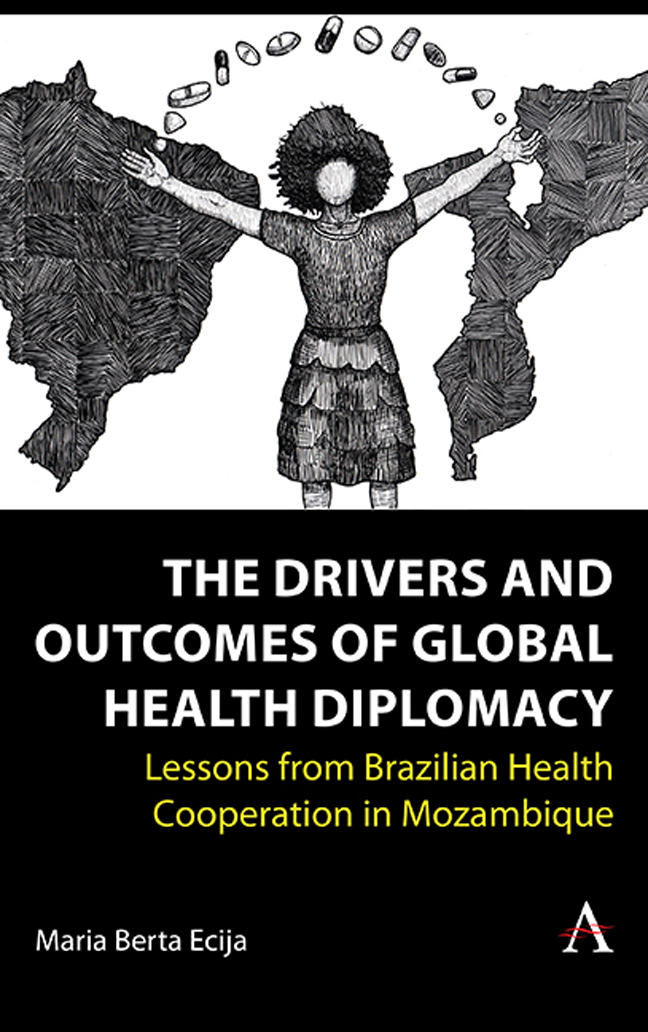 The Drivers and Outcomes of Global Health Diplomacy
The Drivers and Outcomes of Global Health Diplomacy Book contents
- Frontmatter
- Contents
- List of Abbreviations
- 1 Introduction and Methodology
- 2 Literature Review on Global Health Diplomacy – Brazil and Mozambique
- 3 Brazil and Global Health Diplomacy
- 4 Mozambique’s Foreign and Health Policy
- 5 Case Study of Sociedade Moçambicana de Medicamentos
- 6 Analysis and Outcomes
- 7 Conclusion
- Post-script: COVID-19 Disclaimer
- Bibliography
- Index
7 - Conclusion
Published online by Cambridge University Press: 29 February 2024
- Frontmatter
- Contents
- List of Abbreviations
- 1 Introduction and Methodology
- 2 Literature Review on Global Health Diplomacy – Brazil and Mozambique
- 3 Brazil and Global Health Diplomacy
- 4 Mozambique’s Foreign and Health Policy
- 5 Case Study of Sociedade Moçambicana de Medicamentos
- 6 Analysis and Outcomes
- 7 Conclusion
- Post-script: COVID-19 Disclaimer
- Bibliography
- Index
Summary
Findings versus Addressing the Research Question
The initial aim of this research was to understand Brazil’s SSC strategy through cooperation in the field of health. Within that context, Mozambique stood out as the country that received not only the most cooperation programmes but also one of the most important ones: the transference of technology and know-how for the implementation of a pharmaceutical factory in the country. This project, combined with several other cooperation agreements, aimed to strengthen Mozambique’s national response to HIV/AIDS, and to enable general improvements in the population’s quality of life in the country, by upgrading the country’s institutional framework in health.
While there was a solid field of research on the Brazil–Mozambique health partnership, there were many gaps in the literature. For instance, previous research failed to analyse the objectives of this cooperation for both countries, or to verify its results, not only in terms of health, but also in terms of the political and economic motivations behind it. By reviewing the literature, it became clear that the scarcity of research, especially on the ground, combined with the lack of a robust theoretical framework for explaining and exploring the roots and results of this engagement was a weakness within the existing scholarship. In order to overcome these challenges, this research was designed to deliver a robust theoretical background, capable of verifying and analysing this cooperation more deeply.
At first, the hypothesis raised here was that international actors engage in global health because of the soft power component acquired through it. However, when engaging with the literature, it was concluded that the field of global health diplomacy could offer the tools needed to analyse not only Brazil and Mozambique in their roles as global health players but also every actor that engages in health at the international level. Thus, it was realised that within the field of global health diplomacy there was potential to develop a framework that could contribute to our understanding of the motivations and intentions of international actors in health partnerships and negotiations. This insight changed the focus of the research. As a result, instead of looking specifically at Brazil and Mozambique and trying to draw conclusions from these examples, the research led to a deeper exploration of how health partnerships work.
- Type
- Chapter
- Information
- The Drivers and Outcomes of Global Health DiplomacyLessons from Brazilian Health Cooperation in Mozambique, pp. 211 - 226Publisher: Anthem PressPrint publication year: 2023
